Links to external sources may no longer work as intended. The content may not represent the latest thinking in this area or the Society’s current position on the topic.
A bicentenary tribute to Louis Pasteur, Foreign Member of the Royal Society
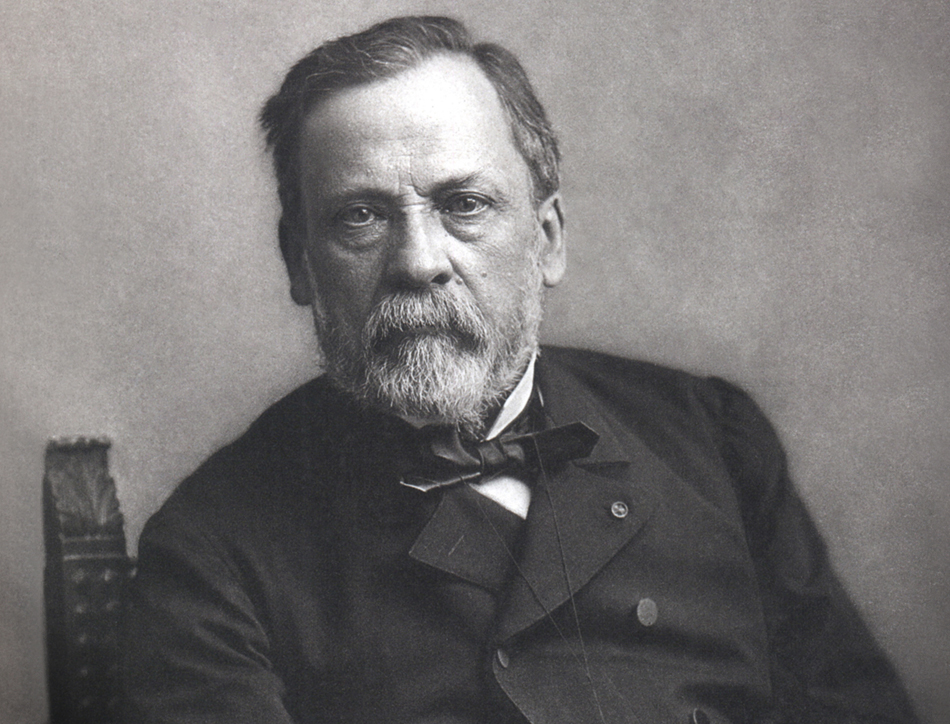
The Institut Pasteur and the Académie des sciences celebrate Louis Pasteur’s bicentenary, with support from the Royal Society. This symposium will present cutting-edge research in Louis Pasteur’s own research areas and promote international cooperation in science and scientific outreach as he did throughout his life.
This event is free to attend. Please register using Eventbrite.
This event will be livestreamed on this webpage and on YouTube.
The Royal Society has an acceptable use policy for all online events, and we expect our users to abide by these guidelines
Schedule
Chair
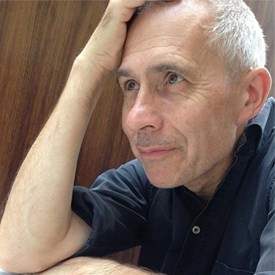
Sir Jim Smith FMedSci FRS, The Francis Crick Institute, UK

Sir Jim Smith FMedSci FRS, The Francis Crick Institute, UK
Jim Smith is renowned for his work on cell-to-cell signalling in the early development of the amphibian embryo. His discovery of a mesoderm-inducing factor secreted by a cell line and establishing its identity as activin transformed the study of induction in the early embryo. He also showed that activin specifies different cell types at different thresholds and that characteristic genes like Brachyury are turned on at specific concentrations. His earlier work demonstrated threshold responses in chick limb development and also showed that the mitogenic response to growth factors can be active when attached to the extracellular matrix.
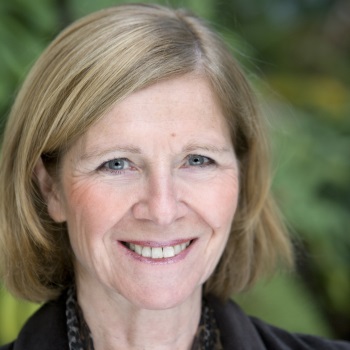
Professor Pascale Cossart ForMemRS, Institut Pasteur, France

Professor Pascale Cossart ForMemRS, Institut Pasteur, France
Pascale Cossart, after studying chemistry in Lille (France) obtained a master degree at Georgetown University, Washington, DC. Back in France, she obtained her PhD in Paris in the Institut Pasteur where she is still now, heading the Bacteria-Cell Interactions unit which is also an Inserm and an INRA unit. After studying DNA-protein interactions, in E. coli, she started in 1986, to study the molecular and cellular basis of infections by intracellular bacteria taking as a model the bacterial pathogen Listeria monocytogenes. Her research has led to a number of new concepts in infection biology but also in fundamental microbiology, in cell biology and more recently in epigenetics.
Pascale Cossart is considered as a pioneer in Cellular Microbiology. Her contributions have been recognized by a number of awards, including the Robert Koch Prize (2007), the Louis Jeantet Prize for Medicine (2008), the Balzan Prize (2013). She is a member of the French Academy of Science (2002), a foreign member of the American National Academy of Science (2009), of the German Leopoldina (2001), and of the Royal Society (2010).
Chair
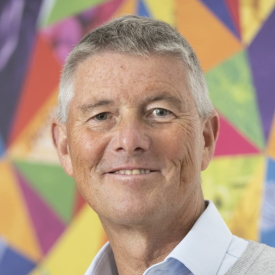
Professor Stewart Cole FRS KCMG, Institut Pasteur, France

Professor Stewart Cole FRS KCMG, Institut Pasteur, France
Stewart Cole is an internationally renowned scientist and Professor of Microbial Pathogenesis. Since 2 January 2018, he is President of the Institut Pasteur.
From 2007 to 2017, he has served as Professor and Director of the Global Health Institute at the Ecole polytechnique fédérale de Lausanne, the Swiss Federal Institute of Technology (EPFL) – a world-leading education and research center.
For 24 years Cole worked as a researcher and also held various research management positions at the Institut Pasteur. He was Director of Strategic Technologies and then Executive Scientific Director, contributing to several patent applications relating to HIV/AIDS, cervical cancer and multidrug-resistant tuberculosis. He participated in the Scientific Advisory Boards of the Institut Pasteur in Iran, the Institut Pasteur in Montevideo and the Institut Pasteur in Lille. Professor Cole was also acting President of the Institut Pasteur in Paris in 2005.
He has been the recipient of many national and international prizes and distinctions. In 2009, he was awarded the World Health Organization’s prestigious Stop-TB Partnership Kochon Prize for his leadership and groundbreaking accomplishments in genetic research on M. tuberculosis and his contribution to novel therapeutic strategies for tackling TB.
During his career, he has been involved in the work of several foundations and scientific committees, and was notably Chair of the board of the Innovative Medicine for Tuberculosis Foundation and President of the commission médicale for the Fondation Raoul Follereau.
Stewart Cole has also published more than 350 scientific papers on infectious diseases, most notably tuberculosis and leprosy.
Professor Cole was awarded with the title of Chevalier of the Legion of Honor in 2004 and was appointed as Knight Commander of the Order of St Michael and St George for service to science, on 1 January 2022.
Chair
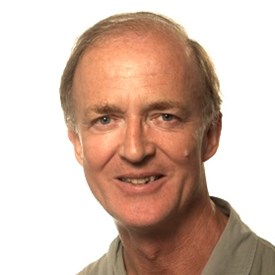
Professor Peter Leadlay FRS, University of Cambridge, UK

Professor Peter Leadlay FRS, University of Cambridge, UK
Peter Leadlay studied chemistry at Oxford (1967-1974), and after a postdoc at ETH Zürich worked at the Biochemistry Department in Cambridge, becoming inaugural Herchel Smith Professor of Biochemistry in 2006. His research interests have centered on the chemistry, biochemistry, genetics, genomics and evolution of microbial natural products; and their role in pharmaceutical discovery. He has deciphered the biosynthetic pathways to multiple classes of antibiotic; and co-discovered the modular paradigm for enzyme catalysis used by multienzymes that synthesise complex polyketides and polypeptides. These pathways can be rationally altered to produce modified chemical products with potentially useful bioactivity. This work has launched the synthetic biology companies Biotica and Isomerase.
He was elected Fellow of the Royal Society in 2000. He held a visiting Chaire de Recherche 'Blaise Pascal' at the Institut Pasteur Paris in 2003; and an international research award of the Alexander von Humboldt Foundation at TU Berlin in 2013. He is the recipient of inter alia the 2003 RSC Celltech Medal, the 2007 Remsen award of the American Chemical Society, and the 2012 Inhoffen Medal of the Helmholtz Foundation for Infection Research, Germany.
| 13:30 - 13:45 |
Chemistry and Biology match together to tackle the Epigenetics and fight diseases
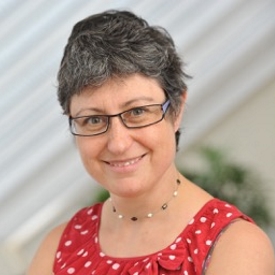
Dr Paola B. Arimondo, CNRS, Institut Pasteur, EpiCBio, France

Dr Paola B. Arimondo, CNRS, Institut Pasteur, EpiCBio, FranceDr Paola B. Arimondo studied Chemistry at the University of Pisa, Italy, and received a PhD in Biophysics at the MNHN in Paris. In 2001, she was recruited by the CNRS. Her research focused on the interactions between nucleic acids and proteins and their modulation by small chemical molecules, resulting in site-specific ‘DNA scissors’ in cancer cells. After a six-month sabbatical in 2005 at the University of California in Berkeley, she initiated a new project aiming at the epigenetic control of gene expression in cancers. In 2011, she was recruited to lead the Laboratory of Epigenetic Targeting of Cancer, a joint public-private Laboratory between the CNRS and Pierre Fabre Laboratories, in Toulouse, France. She now develops chemical modulators of DNA and histone methylation to study the aberrant epigenetic mechanisms in cancer and identify new targets or biomarkers. Dr Arimondo is co-author of 92 publications and of 9 patents, was awarded the ‘Médaille de Bronze’ of CNRS, ‘Prix de l’Encouragement’ of the French Société de Chimie Thérapeutique, and the ‘Marie Curie Excellence Award’ of the European Community. She is actually Oversea Fellow at the Churchill College in Cambridge UK. |
|---|---|
| 13:45 - 14:00 |
The importance of chemistry in antibiotic discovery
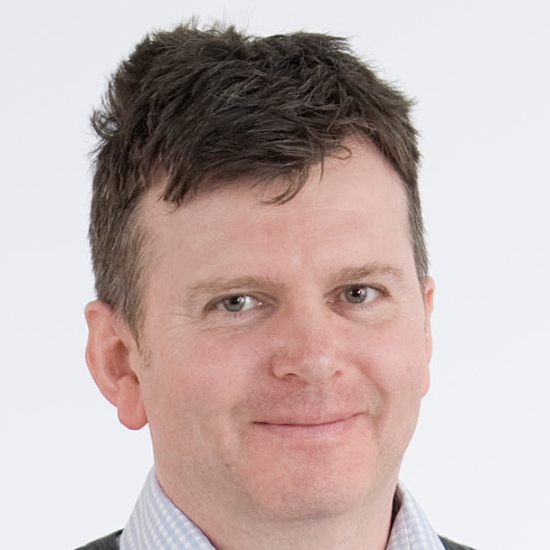
Professor Christopher Schofield FRS, University of Oxford, UK

Professor Christopher Schofield FRS, University of Oxford, UKChris Schofield studied for a first degree in chemistry at the University of Manchester (1979-1982). In 1982 he moved to Oxford to study for a DPhil with Professor Jack Baldwin on the synthesis and biosynthesis of antibiotics. In 1985 he became a Departmental Demonstrator in the Dyson Perrins Laboratory, Oxford University followed by his appointment as Lecturer in Chemistry and Fellow of Hertford College in 1990. In 1998 he became Professor of Chemistry, and in 2011 was appointed Head of Organic Chemistry. He is a Fellow of the Royal Society of Chemistry and of the Royal Society. His research group works at the interface of chemistry, biology and medicine. His work has opened up new fields in antibiotic research, oxygen sensing and gene regulation. His work has identified new opportunities for medicinal intervention that are being pursued by numerous academic and commercial laboratories. |
Chair
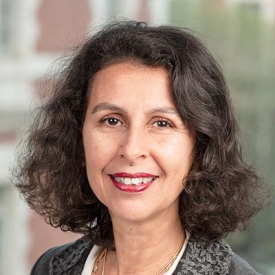
Dr Isabelle Buckle, Institut Pasteur, France

Dr Isabelle Buckle, Institut Pasteur, France
Isabelle Buckle PhD has 25 years of international scientific and business experience in biotechnology, including Vice President of Clinical Applications in Mass Spectrometry at Bruker Daltonics; President and CEO of InGen Biosciences (an in vitro diagnostics company); International Director of Global Key Account Development for the pharmaceutical industry at Life Technologies, now part of Thermo Fisher Scientific; and Regional Director of European Diagnostic Partnerships at Ciphergen Biosystems. Dr Buckle began her career at Pharmacia Biotech, a GE company. She is now Director of Research Applications and Industry Relations at the Institut Pasteur.
| 14:05 - 14:20 |
From Buruli ulcer to cancer: tale of a mycobacterial toxin

Dr Caroline Demangel, Institut Pasteur, France

Dr Caroline Demangel, Institut Pasteur, FranceCaroline Demangel studied life sciences at the National Institute of Agronomy Paris-Grignon (AgroParisTech), where she completed her PhD in cell biotechnology. She worked as a postdoctoral fellow on antibody engineering at Institut Pasteur, where she was offered a staff scientist position. Then, she joined the mycobacteria research group led by Warwick Britton at the Centenary Institute in Sydney, Australia to design and test innovative Tuberculous subunit vaccines targeting dendritic cells. She returned to Institut Pasteur after four years to develop novel approaches to the diagnosis and prevention of neglected mycobacterial diseases, particularly Buruli ulcer and Leprosy, as an scientist in Stewart Cole’s lab then as an independent group leader. Since 2011, she’s been directing a research unit in the Immunology Department, where she currently serves as deputy director. Her group investigates the microbe-immune system dialogue to identify novel bioactive molecules and therapeutic strategies to manipulate immunity. |
|---|---|
| 14:20 - 14:35 |
Translating fundamental principles of immunology into cancer immunotherapies

Professor Caetano Reis e Sousa FMedSci FRS, Francis Crick Institute, UK

Professor Caetano Reis e Sousa FMedSci FRS, Francis Crick Institute, UKCaetano Reis e Sousa obtained a BSc from Imperial College in 1989 and a DPhil from Oxford in 1992. After a postdoc at NIH, he set up his lab in 1998 at the ICRF, later to become CRUK’s London Research Institute and now subsumed into The Francis Crick Institute. Caetano’s research centres on the mechanisms involved in sensing infection, cancer and tissue injury. He has helped to define the cells and pathways involved in innate immune detection of RNA viruses, fungi and dead cells. He was elected a member of EMBO and a Fellow of The Academy of Medical Sciences in 2006, a Fellow of the Royal Society in 2019 and and made an Officer of the Order of Sant’Iago da Espada by his native Portugal in 2009. He is a recipient of numerous awards, including the 2017 Louis-Jeantet Prize for Medicine and the 2019 Bial Award in Biomedicine. Caetano is currently an Assistant Research Director and Principal Group Leader at the Crick where he heads the Immunobiology Laboratory. He is also Visiting Professor of Immunology at Imperial College and honorary professor at UCL and King’s College London and co-founder of Adendra Therapeutics. |
Chair
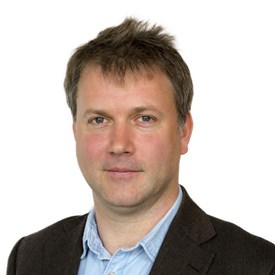
Dr Ewan Birney CBE FRS FMedSci

Dr Ewan Birney CBE FRS FMedSci
Ewan Birney is Deputy Director General of EMBL. He is also Director of EMBL-EBI with Dr Rolf Apweiler and runs a small research group.
Ewan completed his PhD at the Wellcome Sanger Institute with Richard Durbin. In 2000, he became Head of Nucleotide data at EMBL-EBI and in 2012 he took on the role of Associate Director at the institute. He became Director of EMBL-EBI in 2015. In 2020, Ewan became the Deputy Director General of EMBL. In this role, he assists the EMBL Director General in relation to engagement with EMBL Member States and external representation.
Ewan led the analysis of the Human Genome gene set, mouse and chicken genomes and the ENCODE project, focusing on non-coding elements of the human genome. Ewan’s main areas of research include functional genomics, DNA algorithms, statistical methods to analyse genomic information (in particular information associated with individual differences in humans and Medaka fish) and use of images for chromatin structure.
Ewan is a non-executive Director of Genomics England, and a consultant and advisor to a number of companies, including Oxford Nanopore Technologies, Dovetail Genomics and GSK. Ewan was elected an EMBO member in 2012, a Fellow of the Royal Society in 2014 and a Fellow of the Academy of Medical Sciences in 2015. In 2019, Ewan became a Board Member of the Biotechnology and Biological Sciences Research Council (BBSRC).
He has received a number of awards including the 2003 Francis Crick Award from the Royal Society, the 2005 Overton Prize from the International Society for Computational Biology and the 2005 Benjamin Franklin Award for contributions in Open Source Bioinformatics.
| 15:00 - 15:15 |
The Achilles' heel of the SARS-CoV-2 Spike

Professor George Kassiotis, Francis Crick Institute, UK

Professor George Kassiotis, Francis Crick Institute, UKGeorge Kassiotis is currently a Senior Group Leader and head of the laboratory of Retroviral Immunology at the Francis Crick Institute, London, UK. He is also a Professor of Retrovirology, at the Department of Medicine, Imperial College London, UK, and recipient of a New Investigator Award from the Wellcome Trust, UK. His doctoral studies, with Lesley Probert and George Kollias at the Hellenic Pasteur Institute, Athens, Greece, focused on transgenic mouse models for human neuroimmunological diseases. He carried out postdoctoral studies with Brigitta Stockinger at the Medical Research Council's National Institute for Medical Research in Mill Hill, London, UK, on T cell homeostasis and immunological memory. His laboratory's current work concentrates on innate and adaptive immune responses to endogenous and exogenous retroviruses. |
|---|---|
| 15:15 - 15:30 |
SARS-CoV-2 variants, sub-variants and sub-sub-variants
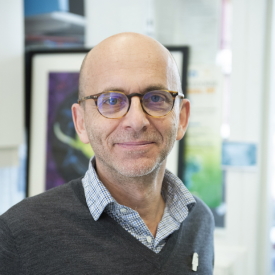
Professor Olivier Schwartz, Institut Pasteur, France

Professor Olivier Schwartz, Institut Pasteur, FranceProfessor Olivier Schwartz is a pharmacist and graduate of the University of Paris 7 (PhD in Virology and HDR). Author of more than 160 publications, he is a specialist in HIV multiplication, its interaction with the immune system and the pathophysiology of infection. His research also focuses on the multiplication of other viruses such as the Zika virus. His work has been rewarded by various scientific distinctions, including the "Louis Tartois" Foundation for Medical Research Prize and the "Georges Zermati" Foundation of France Prize from the city of Paris. He is a member of EMBO. |
Chair
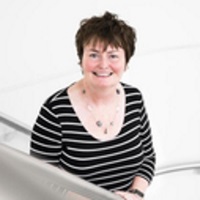
Professor Fiona Powrie FRS, Kennedy Institute of Rheumatology, University of Oxford, UK

Professor Fiona Powrie FRS, Kennedy Institute of Rheumatology, University of Oxford, UK
Professor Dame Fiona Powrie is Director of the Kennedy Institute of Rheumatology, University of Oxford, a Fellow of the Royal Society and the Academy of Medical Sciences and a Governor of the Wellcome Trust.
She gained a PhD in immunology at the University of Oxford and then moved to the DNAX Research Institute in Palo Alto, before returning to Oxford in 1996 as a Wellcome Trust Senior Research Fellow. Prior to her appointment to the Kennedy Institute, Fiona Powrie was the Sidney Truelove Professor of Gastroenterology and Head of the Translational Gastroenterology Unit, Oxford (2009- 2014).
Her research examines the relationship between the intestinal microbiome and the host immune system and how this mutualistic relationship breaks down in inflammatory bowel disease, arthritis and cancer.
Fiona Powrie has received numerous prestigious prizes and awards, including the Louis Jeantet Prize for Medicine in 2012. She was elected an international member of the National Academy of Sciences in 2020 and was appointed Deputy Chair of the Wellcome Board of Governors and Dame Commander of the Most Excellent Order of the British Empire (DBE), for services to Medical Science, in 2022.
| 15:35 - 15:50 |
Malaria vaccine development: a new era

Professor Adrian Hill KBE FMedSci FRS, University of Oxford, UK

Professor Adrian Hill KBE FMedSci FRS, University of Oxford, UKAdrian Hill trained at Trinity College Dublin and Oxford is now Professor of Human Genetics and Director of the Jenner Institute at Oxford University. He leads research programmes in genetic susceptibility to tropical infectious diseases and in vaccine design and development. As a founder member of the Wellcome Trust Centre for Human Genetics since 1994 his research group has studied multiple genetic factors associated with or genetically linked to resistance to malaria, tuberculosis, bacterial pneumonia, and viral infections such as hepatitis B and C and HIV. His group has pioneered genome-wide linkage and association analyses of genetic susceptibility to common human infectious diseases, particularly tuberculosis, more recently as part of the Wellcome Trust case control consortium. Data on immunogenetic susceptibility factors have provided new insights into the impact of infections on human genomic diversity. He has published over 350 research papers, is a Fellow of the UK Academy of Medical Sciences and the Royal College of Physicians, and a NIHR Senior Investigator. |
|---|---|
| 15:50 - 16:05 |
Chemistry for advancing innovative vaccine development: from concept to first-in-human study

Dr Laurence Mulard, Institut Pasteur, France

Dr Laurence Mulard, Institut Pasteur, FranceDr Laurence Mulard graduated from the ESPCI (Ecole Supérieure de Physique et Chimie Industrielles de la ville de Paris, France) and the same year completed her MSc in Chemistry at the University Pierre et Marie Curie (UPMC, Paris, France). She received a PhD in Organic Chemistry from the same university working toward novel cancer therapeutics. After three postdoctoral years at the National Institutes of Health (NIH, Bethesda, MD, USA) studying glycoscience in the group of Dr Glaudemans, she joined the Organic Chemistry Unit at Institut Pasteur (Paris, France), where she set up a group on synthetic bacterial carbohydrates. She was promoted Research Director in 2007 and was appointed head of the Chemistry of Biomolecules Unit a year later. Her research interests are in the area of peptide science and glycoscience. Her research programs deal with the development of chemical tools and bioactive compounds aimed at interfering with molecular phenomena governing infectious diseases. Interfacing chemistry, structural biology, immunochemistry and vaccinology, special focus has been on investigating a chemistry-driven multidisciplinary strategy towards the development of original conjugate vaccines against diarrheal diseases. Her major implication in translational sciences and technological transfer has led to the first-in-human Shigella synthetic carbohydrate-based vaccine candidate. Her contribution was distinguished on various occasions, including by the 2016 Thérèse Lebrasseur award from the Fondation de France. |
Chair
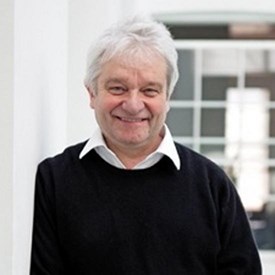
Sir Paul Nurse CH FMedSci FRS, Francis Crick Institute, UK

Sir Paul Nurse CH FMedSci FRS, Francis Crick Institute, UK
Paul Nurse is a geneticist and cell biologist whose discoveries have helped to explain how the cell controls its cycle of growth and division. Working in fission yeast, he showed that the cdc2 gene encodes a protein kinase, which ensures the cell is ready to copy its DNA and divide. Paul’s findings have broader significance since errors in cell growth and division may lead to cancer and other serious diseases.
Paul’s contributions to cell biology and cancer research were recognised with a knighthood in 1999. In addition, Paul’s endeavours relating to the discovery of cell cycle regulatory molecules saw him jointly awarded the Nobel Prize for Physiology or Medicine in 2001.
Over the last thirty years, Paul has held many senior research leadership roles. In 2010, he was elected as President of the Royal Society for a five-year term. Since 2011, he has been the Director and Chief Executive of the Francis Crick Institute, a London-based biomedical research institute due to open in 2015.
